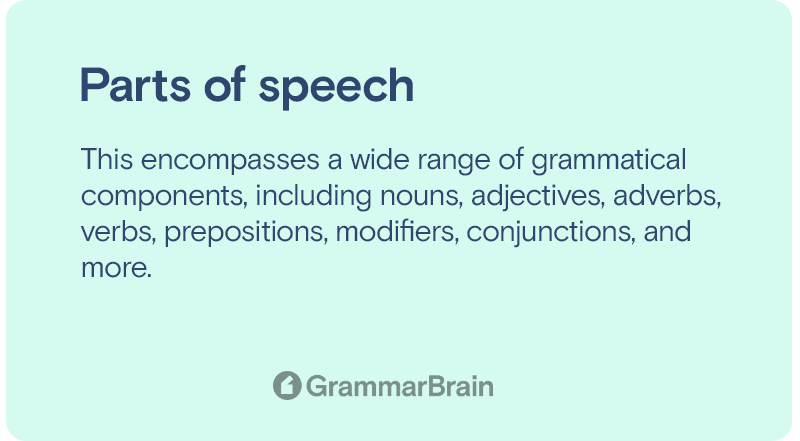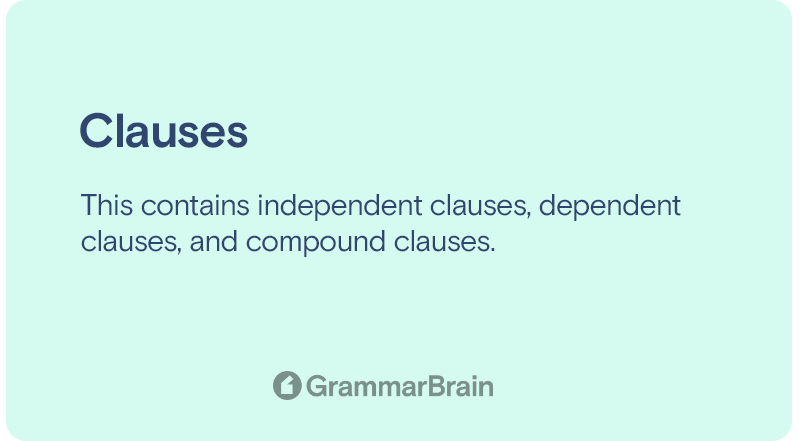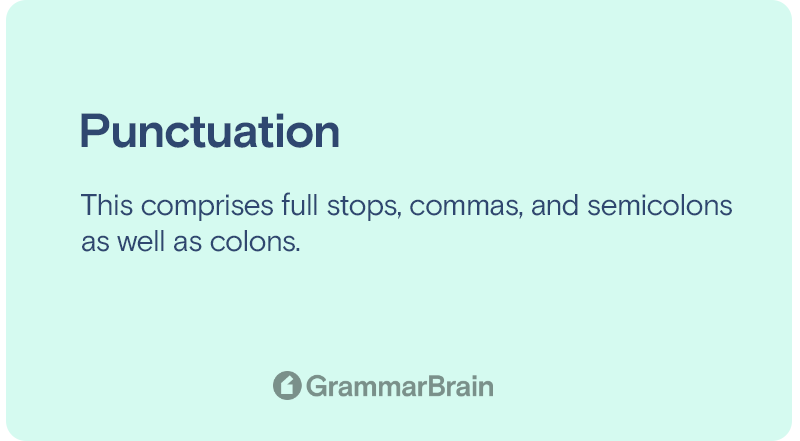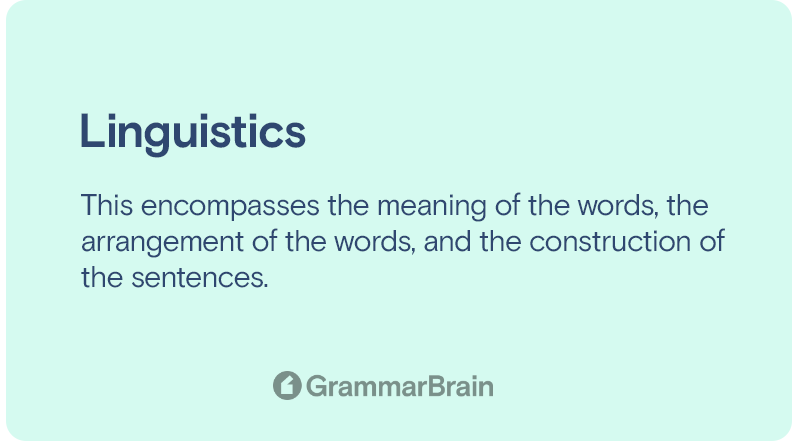What is grammar? The majority of people consider themselves to be grammar rebels because they view the rules as being overly prescriptive, fundamental, and capricious.
However, grammar is actually quite complicated. The use of grammar that is not accurate can lead to confusion and alter the way others view you.
What is grammar?
The system of a language is known as its grammar.
At its most fundamental, the term “grammar” refers to a set of rules that, when followed, enable us to construct meaningful sentences.
It covers a variety of facets of the English language, including the following:

1. The different parts of speech
This encompasses a wide range of grammatical components, including nouns, adjectives, adverbs, verbs, prepositions, modifiers, conjunctions, and more.

2. Clauses
This contains independent clauses, dependent clauses, and compound clauses.

3. The use of punctuation
This comprises full stops, commas, and semicolons as well as colons.
| Symbol | Name | Example |
| . | Period | I got this at the fair. |
| ? | Question mark | How many trucks does he have? |
| ! | Exclamation point | Wow! You’re a great rider. |
| , | Comma | I like the movie, but the color grading is odd to me. |
| : | Colon | Here are some fun ideas for the party: trivia questions, shuffle board, and more. |
| ; | Semicolon | I’ll visit you once I’m done with work; that’s a promise. |
| – | Hyphen | I have double-life situations. |
| – | En dash | How long is a China-Russia fight? |
| — | Em dash | The dog—and I’m afraid of four-legged animals—was so adorable. |
| ( ) | Parentheses | His favorite team (Chicago Bulls) has a chance to win the title. |
| [ ] | Square brackets | The AP writer said “[head] of baseball operations was disappointed.” |
| { } | Curly brackets | The colors {orange, green, lilac, blue} are for the garage. |
| < > | Angle brackets | |
| “ ” | Quotation marks | Bryan called it a “great situation.” |
| ‘ | Apostrophe | Some of Susan’s clothes are missing. |
| / | Slash or Virgule | I’m ordering food/dessert/more. |
| … | Ellipses | According to the school the “president… was disappointed.” |
| * | Asterisk | *Data from The Economist |
| & | Ampersand | Tiffany & Co. |
| • | Bullet point | • Simple • Great • Awesome |
| # | Pound symbol | #1 selling |
| ~ | Tilde | Bryan owns ~10 pairs of shoes. |
| \ | Backslash | |
| @ | At symbol | mary@gmail.com |
| ^ | Caret symbol | 3^3 = 27 |
| | | Pipe symbol |

4. The fundamentals of linguistic mechanics
This encompasses the meaning of the words, the arrangement of the words, and the construction of the sentences.
Due to the breadth of its application, grammar can make proofreading challenging.
And the dry, scholarly discussions that frequently circle around it might cause people’s eyes to glaze over, which is not a good look.
But if not for these grammatical restrictions, there would be complete anarchy.
Various forms of grammar
Ever since there have been rules for grammar, there have also been theories about what makes it work and how it should be categorized.
One such example is the work of the American linguist Noam Chomsky, who developed the concept of universal grammar. It states that there are certain norms that apply to all languages.
According to his point of view, people naturally have knowledge of a language that contributes to the formation of those norms.
He reasoned that this was the reason why youngsters are able to pick up complicated language without having explicit awareness of the rules. However, there is an ongoing dispute among grammar experts regarding the validity of this idea.
There are also forms of grammar known as prescriptive and descriptive grammar.
The collection of guidelines that people are expected to adhere to when using the English language is known as prescriptive grammar.
Grammar that is descriptive is the type of grammar that describes how people are using language.
These different varieties of English grammar give rise to another hypothesis, which is the supremacy of spoken language. It is the spoken word, not the written word, that is said to be the origin of language. Despite the fact that not everyone subscribes to that viewpoint either.
Grammar rules
Writing can be improved by avoiding these six typical errors in grammar, which are listed below:
- Semicolons are often used to connect thoughts that are connected to one another. On the other hand, rather than a semicolon, a new phrase is frequently more appropriate.
- Some people used to believe that it was incorrect to conclude a statement with a preposition, but that opinion has since changed. Nevertheless, in most informal settings, it is now considered appropriate.
- When appropriate, avoid splitting infinitives, but in other contexts, it’s quite acceptable.
- It’s fine to do so so long as the sentence is finished when a sentence is started with the word because.
- The subject-verb agreement requires that the plurality of the subject be reflected in the verb of the sentence (or singularity).
- In most situations, utilize active voice. This indicates that the subject exerts influence over the verb. When a statement is written in the passive voice, the verb acts as an agent on the subject, resulting in a less powerful sentence.
What does it mean to be “editing for grammar”?
The process of proofreading your own documents or the documents of others to ensure that they are accurate in terms of grammar use is referred to as editing for grammar.
- Accurate in terms of grammar
- Use and suitable in terms of rhetoric
FAQs
1. What exactly is the difference between syntax and grammar?
The arrangement of words and phrases, as well as the principles that govern how sentences should be constructed, is referred to as syntax.
Therefore, syntax can be classified as part of the grammar category; but, it is not the same thing.
2. To speak and write correctly in English, is it necessary to have a strong grasp of the language’s grammar?
Certainly not in every case. Have sufficient knowledge to utilize English correctly in a variety of everyday settings. After that, improve your knowledge by using several grammatical tools.
Sources
- What is Grammar?
- What is grammar? Grammar definition and examples
- English Grammar: Discussions, Definitions, and Examples
- Grammar
Inside this article
Fact checked:
Content is rigorously reviewed by a team of qualified and experienced fact checkers. Fact checkers review articles for factual accuracy, relevance, and timeliness. Learn more.
Core lessons
Glossary
- Abstract Noun
- Accusative Case
- Anecdote
- Antonym
- Active Sentence
- Adverb
- Adjective
- Allegory
- Alliteration
- Adjective Clause
- Adjective Phrase
- Ampersand
- Anastrophe
- Adverbial Clause
- Appositive Phrase
- Clause
- Compound Adjective
- Complex Sentence
- Compound Words
- Compound Predicate
- Common Noun
- Comparative Adjective
- Comparative and Superlative
- Compound Noun
- Compound Subject
- Compound Sentence
- Copular Verb
- Collective Noun
- Colloquialism
- Conciseness
- Consonance
- Conditional
- Concrete Noun
- Conjunction
- Conjugation
- Conditional Sentence
- Comma Splice
- Correlative Conjunction
- Coordinating Conjunction
- Coordinate Adjective
- Cumulative Adjective
- Dative Case
- Determiner
- Declarative Sentence
- Declarative Statement
- Direct Object Pronoun
- Direct Object
- Diction
- Diphthong
- Dangling Modifier
- Demonstrative Pronoun
- Demonstrative Adjective
- Direct Characterization
- Definite Article
- Doublespeak
- False Dilemma Fallacy
- Future Perfect Progressive
- Future Simple
- Future Perfect Continuous
- Future Perfect
- First Conditional
- Irregular Adjective
- Irregular Verb
- Imperative Sentence
- Indefinite Article
- Intransitive Verb
- Introductory Phrase
- Indefinite Pronoun
- Indirect Characterization
- Interrogative Sentence
- Intensive Pronoun
- Inanimate Object
- Indefinite Tense
- Infinitive Phrase
- Interjection
- Intensifier
- Infinitive
- Indicative Mood
- Participle
- Parallelism
- Prepositional Phrase
- Past Simple Tense
- Past Continuous Tense
- Past Perfect Tense
- Past Progressive Tense
- Present Simple Tense
- Present Perfect Tense
- Personal Pronoun
- Personification
- Persuasive Writing
- Parallel Structure
- Phrasal Verb
- Predicate Adjective
- Predicate Nominative
- Phonetic Language
- Plural Noun
- Punctuation
- Punctuation Marks
- Preposition
- Preposition of Place
- Parts of Speech
- Possessive Adjective
- Possessive Determiner
- Possessive Case
- Possessive Noun
- Proper Adjective
- Proper Noun
- Present Participle
- Prefix
- Predicate



